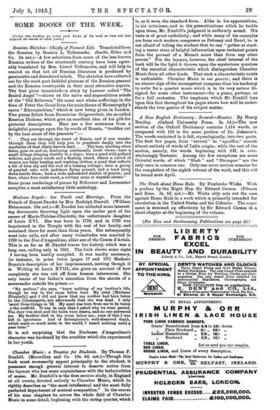Heinemann. 10s. net.)—M. Daudet has collected some interest- ing documents
throwing light upon the earlier part of the career of Marie-Therese-Charlotte, the unfortunate daughter of Louis XVL She was born in 1778, and in 1792 was imprisoned in the Temple with the rest of her family, and remained there for more than three years. She subsequently went into exile, and after many vicissitudes was married in 1799 to the Duc d'Angouleme, elder son of the Comte d'Artois.
This is as far as M. Daudet traces her history, which was a long one, ending only in 1851. The book shows some signs f having been hastily compiled. It was hardly necessary, :or instance, to print twice (pages 17 and 107) Madame Royale's description of her imprisonment, moving though it is. Writing to Louis XVIII., she gives an account of how completely she was cut off from human intercourse. She only learnt of her father's execution from the shouts of a newsvendor outside the prison :-
"My mother," she says, "knew nothing of my brother's life, though he was in the room below hers. My aunt [Madame Elizabeth) and I did not know that my mother had been taken to the Conciergerie, nor afterwards that she was dead. I only -earnt these things in '95. My aunt was torn from me to be taken o the scaffold. It was in vain that I asked why we were parted. The door was shut and the bolts were drawn, and no one answered me. My brother died in the room below me ; even of this I was left in ignorance. And of Robespierre's well-deserved death, which made SD much noise in the world, I heard nothing until a year later."
It is not surprising that the Duchesse d'Angouleme's character was hardened by the cruelties which she experienced in her youth.


















































 Previous page
Previous page